Author: Valentyna Chabanova-Babak, Content Manager, Link platform
Since May 2024, the Link local coordination mechanism has been collecting and verifying not only humanitarian but also legal needs of residents of de-occupied communities in Southern Ukraine. This material continues to demonstrate the picture of legal needs of citizens living in de-occupied communities of Mykolaiv and Kherson oblasts. We analyze the number of referrals to partner organizations and redirections to various institutions, the number of previous requests for legal assistance, and needs that have lost relevance or been temporarily suspended. The Link mechanism is implemented by the Legal Development Network in partnership with the Czech humanitarian organization People in Need, funded by the UK government.
Over more than two years, 160 legal needs were recorded in Kherson Oblast and 79 in Mykolaiv Oblast. Most often, lawyers receive requests during field visits to communities. Most requests concern civil and administrative law, and the majority of applicants are women. More details about key issues, methods of contact, and the profile of a typical service recipient can be found in the previous material.
How Often Client Referrals and Redirections Occur
The main task of the Link platform is to collect and verify needs. For effective assistance, the team refers beneficiaries to partner organizations or redirects them to government agencies, courts, or notaries.
In Kherson Oblast, Link has 7 partners and completed 8 referrals. In Mykolaiv Oblast, there are also 7 partners and 15 referrals.
Partners To Whom Referrals Were Made In Kherson Oblast
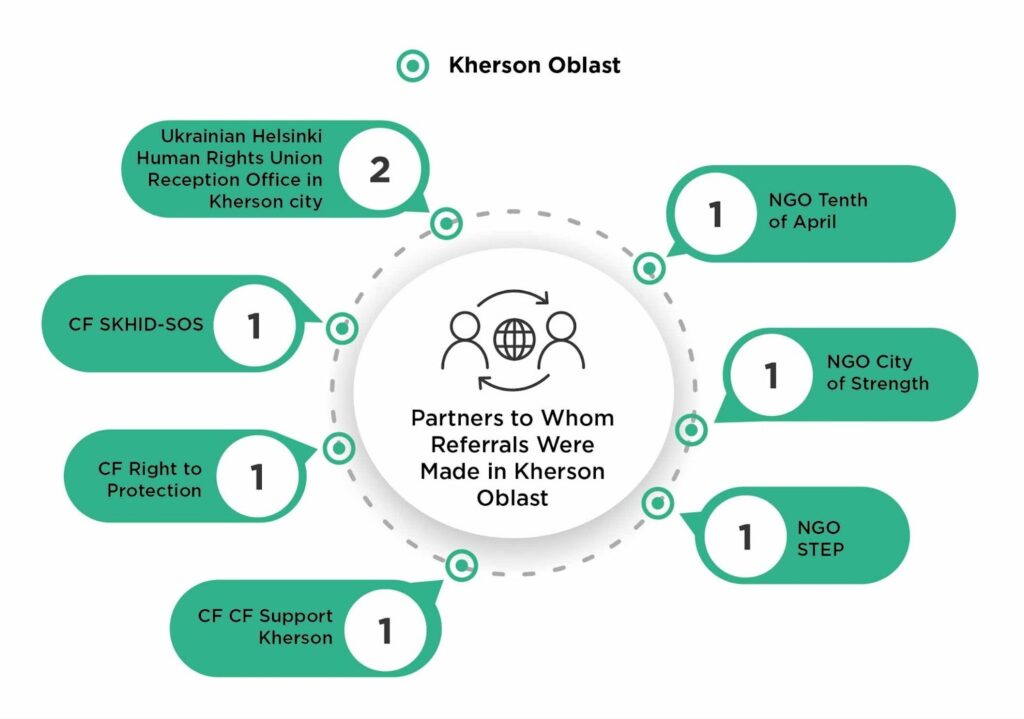
Two referrals were made to the UGFLA Reception Office in Kherson city, and one each to other partners.
Partners To Whom Referrals Were Made In Mykolaiv Oblast
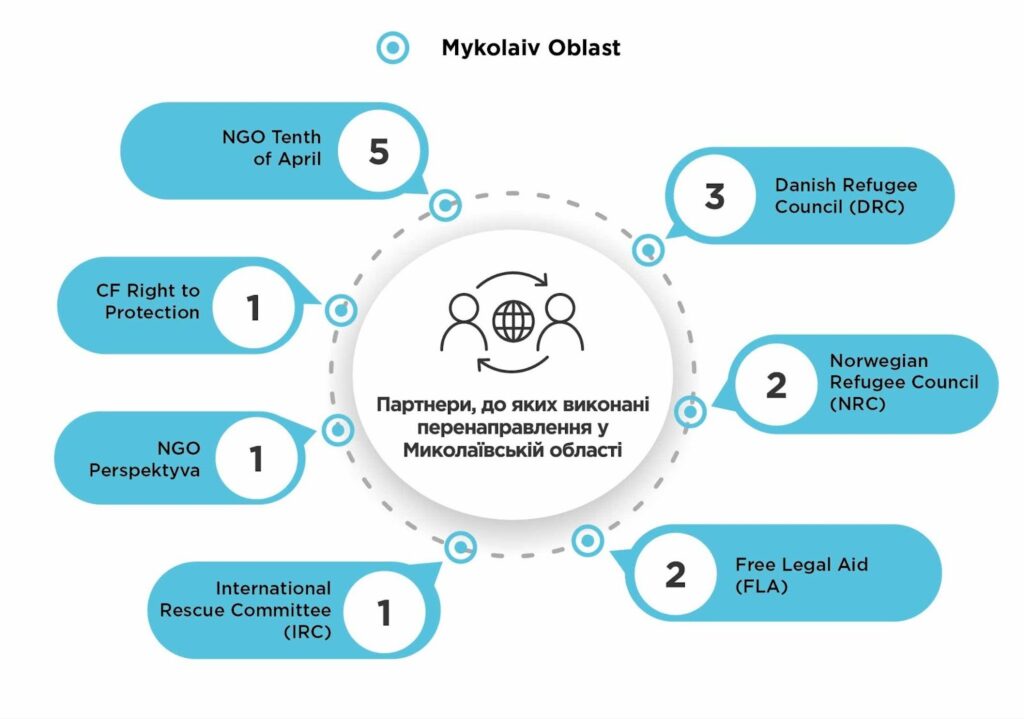
The most referrals in Mykolaiv Oblast were to NGO “Tenth of April.” In second place—the Danish Refugee Council (DRC). Two referrals each were made to the Norwegian Refugee Council (NRC) and Free Legal Aid (FLA), and one each to other partners.
Usually, a beneficiary is referred to one partner. Only one case was recorded where referral occurred to two organizations simultaneously.
Regarding redirections, 23 were made in Kherson Oblast and 18 in Mykolaiv Oblast.
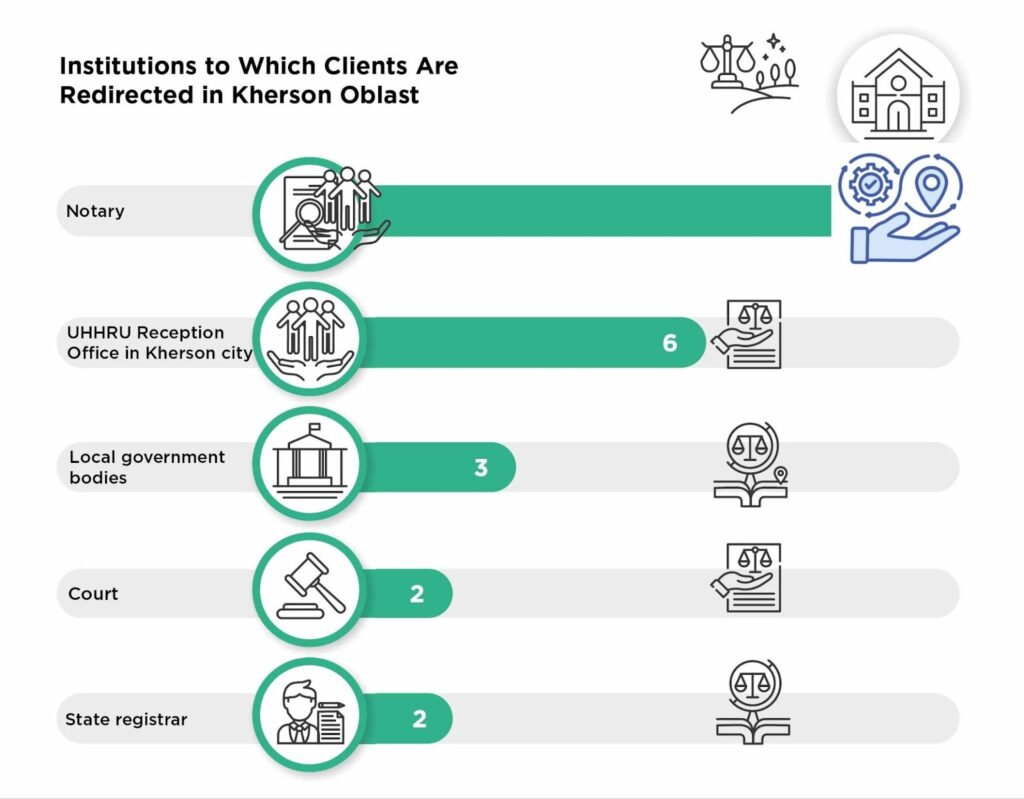
Most often redirected to notaries. Also, a significant number of people in Kherson Oblast were redirected to the UGFLA Reception Office in Kherson city. Significantly fewer—to local government bodies, courts, and state registrars. There are also isolated cases of redirection to the Bureau of Technical Inventory (BTI), the social services department, and the National Information Bureau on Prisoners of War.
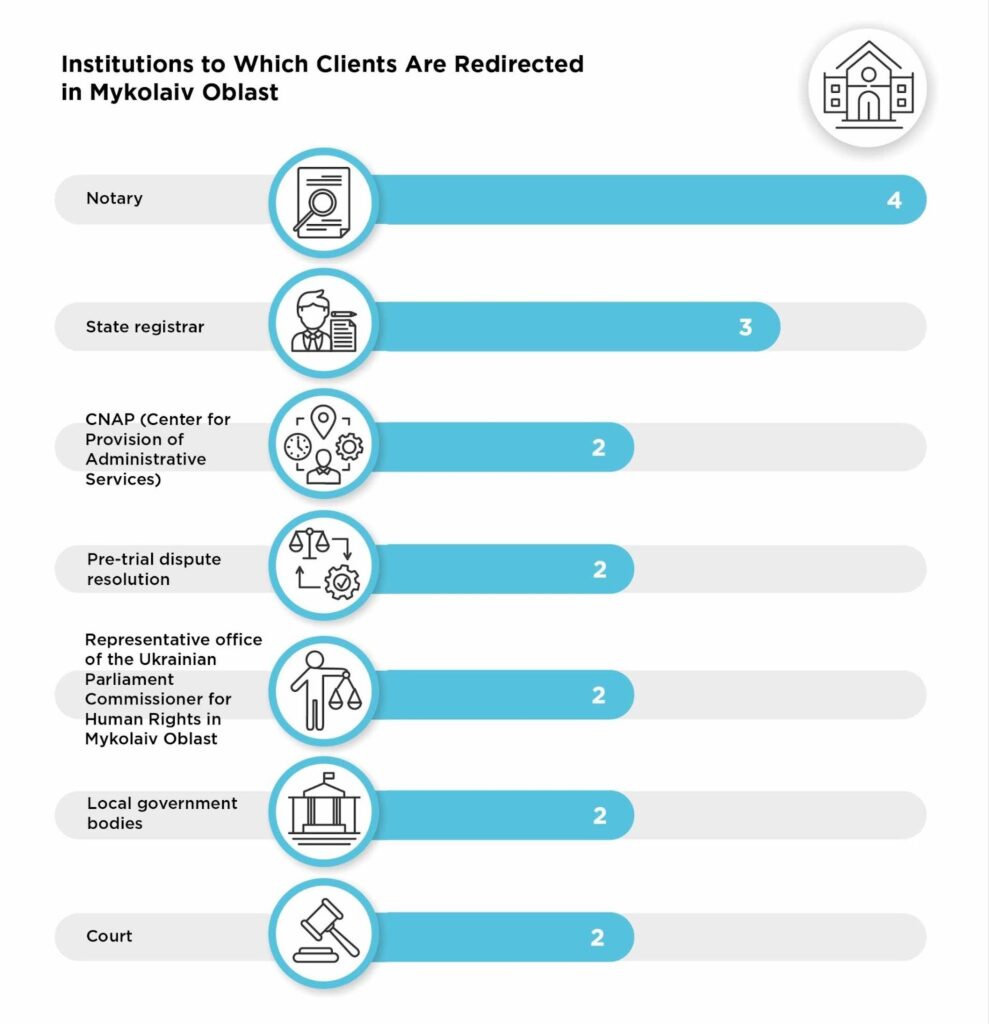
In Mykolaiv Oblast, the redirection statistics look different—more evenly distributed across various institutions. The number of redirections to notaries still takes first place, though with a small margin from others. In addition to those listed in the table, there are isolated cases of redirection to the consulate and BTI.
Clients’ Previous Requests to Institutions and Organizations
We analyzed the number of clients who previously had requests to another institution or organization. In Kherson Oblast, out of 146 people, 13 had previously contacted partners or organizations. In Mykolaiv Oblast, out of a total of 67 people, 20 had previously contacted them.
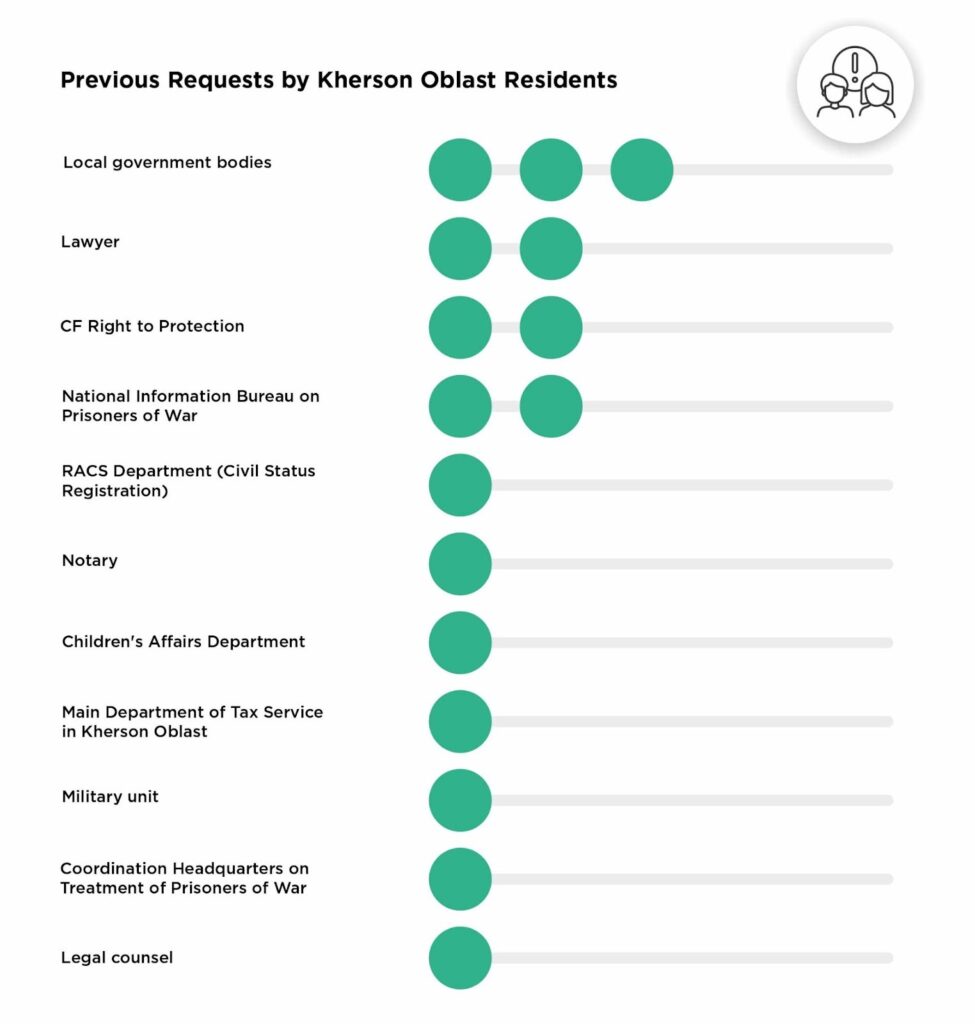
The largest share among recipients of previous requests—local government bodies. Clients also contacted lawyers, the partner Charitable Foundation “Right to Protection,” and the National Information Bureau on Prisoners of War. The total number of requests is greater than 13, as often one client had previously contacted several institutions.
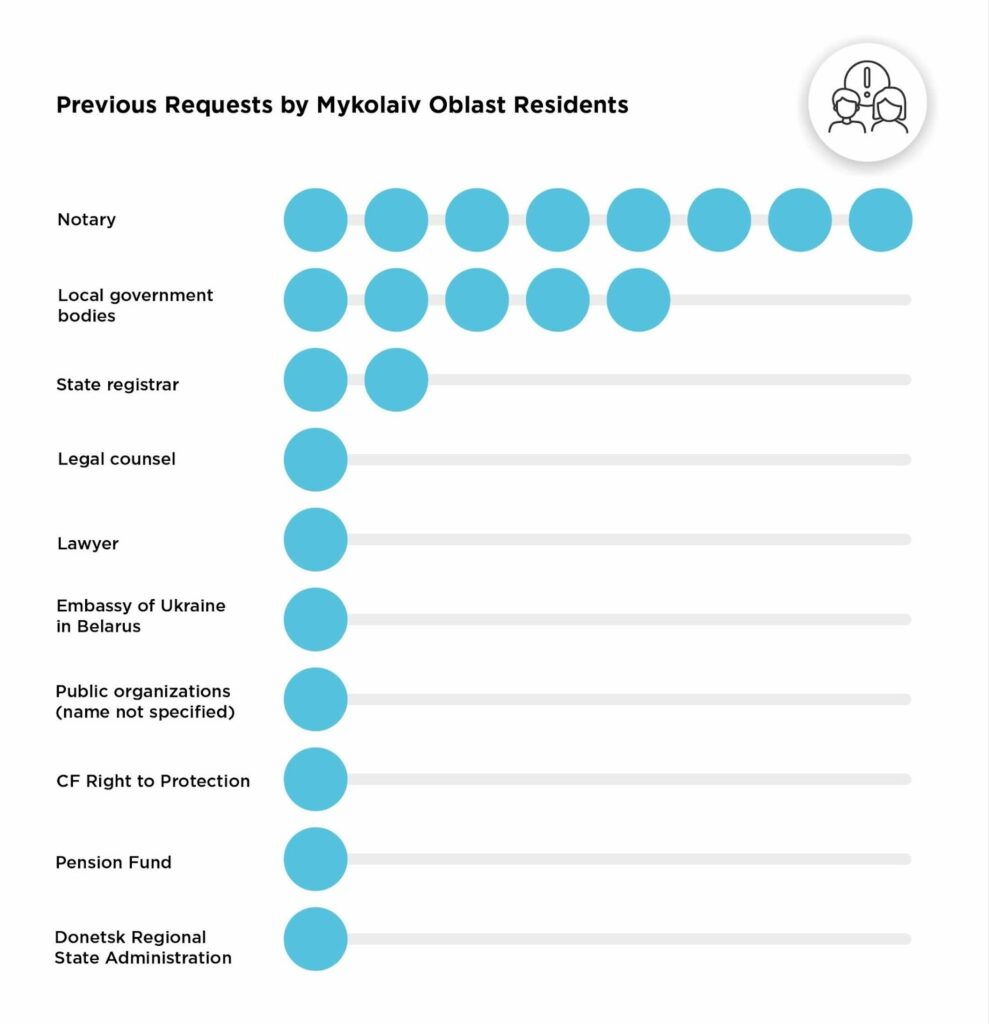
In Mykolaiv Oblast, significantly more previous requests were to notaries. In second place by number—requests to local government bodies. Other institutions and organizations are represented once each, requests to state registrars were recorded twice. Often one client had previously contacted several institutions or organizations, so the total number of requests is greater than 20.
Number of Needs That Lost Relevance and Number of Temporarily Suspended Cases
Of 160 recorded and verified legal needs in Kherson Oblast, three are currently temporarily suspended and two have lost relevance. Among the reasons for temporary loss of relevance, two are related to martial law restrictions: suspension of housing privatization during martial law and the location of the client’s damaged house in an active combat zone. The third case was suspended due to the impossibility of registering a place of residence without the participation of the house owner, who is currently missing in action.
In the two needs with “Lost relevance” status, one is related to the client’s change of residence: due to the security situation, she left Kherson Oblast and entered into an agreement with a lawyer in Odesa city. In the second case, the client decided not to go to court with her case for now.
Of 79 legal needs in Mykolaiv Oblast, three are also temporarily suspended and two have lost relevance. The reasons for loss of relevance for both needs are not specified. In cases that temporarily lost relevance, two were suspended due to lack of motivation and funds in the beneficiary due to illness; in the third case, the reason is not specified.
Thus, only a small number of needs lose relevance; most remain urgent and await resolution.
As a reminder, the Link local humanitarian response coordination mechanism is implemented by the Legal Development Network in partnership with the Czech humanitarian organization People in Need, funded by the UK government. Link helps connect those who need assistance with those who can provide it.